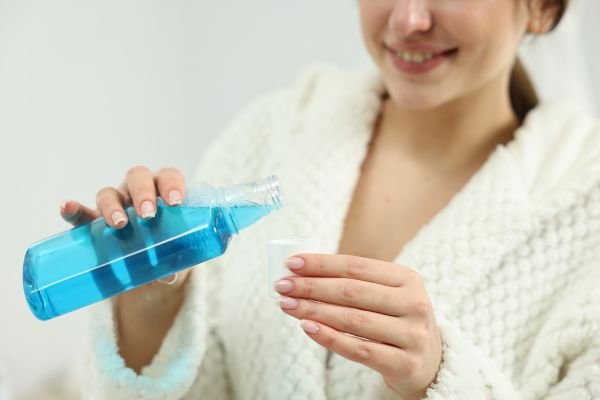Today, a healthy lifestyle has received increasing attention, and personal oral care has become an indispensable part of people’s lives. Especially in the fast-paced life, mouthwash, as a convenient oral cleaning product, has been favored by consumers. Various brands and types of mouthwashes are emerging in the market, and consumers are also faced with the confusion of choice. This article will deeply analyze the most popular mouthwashes on the market, including their functions, ingredients, applicable groups and how to choose the right product for you. I hope that through careful analysis, you can make a wise decision.

Mouthwash is a liquid oral care product designed to inhibit bacterial growth, reduce bad breath and serve as a supplement to daily dental cleaning. Using mouthwash is usually simple: take an appropriate amount of mouthwash in your mouth, and spit it out after passing it through various parts of the mouth.
1. The main functions of mouthwash
(1) Antibacterial effect: Many mouthwashes contain antibacterial ingredients, which can effectively reduce the growth of bacteria in the mouth, thereby reducing the risk of oral infection and periodontal disease.
(2) Oral freshness: Mouthwash can keep the mouth fresh. Specific aroma ingredients, such as mint or fennel, can effectively remove bad breath and give people a fresh feeling.
(3) Prevent tooth decay: Some mouthwashes have added ingredients such as fluoride to enhance the mineral protection of teeth and reduce the occurrence of caries.
(4) Maintain oral acid-base balance: Alkaline mouthwash can help neutralize acidic substances in the mouth, thereby protecting tooth enamel and reducing the risk of tooth decay.
2. Classification of the most popular mouthwashes
With the diversification of market needs, the types and functions of mouthwashes are becoming increasingly rich. According to different ingredients and functions, mouthwashes can be divided into the following categories:
(1) Mouthwash with chemical ingredients that inhibit dental plaque
Dental plaque is one of the main causes of oral diseases, so mouthwashes that inhibit the formation of dental plaque are very popular.
This type of mouthwashes usually contains some chemical ingredients, such as chlorhexidine, triclosan, etc., which can effectively inhibit the growth and reproduction of bacteria, thereby preventing the formation of dental plaque.
Chlorhexidine is one of the most widely used antibacterial ingredients. It has a broad-spectrum antibacterial effect and can inhibit the growth of many bacteria. Using a chlorhexidine mouthwash can immediately exert an antibacterial effect after brushing your teeth and effectively control the accumulation of dental plaque. In addition, triclosan is also a common antibacterial ingredient that can inhibit the metabolic activity of bacteria, thereby preventing the formation of dental plaque.
The advantage of this type of chemical mouthwashes is that it can quickly and effectively control dental plaque, thereby preventing the occurrence of oral diseases such as gingivitis and periodontitis. However, it should also be noted that long-term use of mouthwash containing chemical ingredients may cause irritation to the oral mucosa, so it needs to be used appropriately according to personal circumstances.
(2) Chinese herbal medicine mouthwash
In recent years, mouthwashes with Chinese herbal medicine as the main ingredient have become increasingly popular among consumers. This type of mouthwash usually contains Chinese medicinal materials such as Scutellaria baicalensis, Honeysuckle, Sophora flavescens, etc., which have antibacterial, anti-inflammatory, and anti-bad breath effects.
The advantage of Chinese herbal mouthwash is that it can gently regulate the oral environment without irritating the oral mucosa. At the same time, the bioactive ingredients contained in Chinese medicinal materials can also play antibacterial and anti-inflammatory roles, thereby achieving the purpose of improving oral hygiene. In addition, Chinese herbal mouthwashes also have a certain function of removing bad breath, can effectively control the metabolites of oral bacteria, and improve oral odor.
Compared with chemical mouthwashes, the effect of Chinese herbal mouthwashes may take some time to appear, but long-term use is safer and gentler. Therefore, this type of mouthwash is more suitable for consumers who are sensitive to chemical ingredients or pursue natural care.
(3) Herbal mouthwashes
Mouthwashes with various herbs as the main ingredients are also gaining more and more attention. This type of mouthwash usually contains ingredients such as aloe vera, green tea, and propolis, which have antibacterial, anti-inflammatory, and bad breath removal effects.
Compared with chlorhexidine mouthwashes, herbal mouthwashes can also effectively control the formation of dental plaque, but are less irritating to the oral mucosa. At the same time, herbal mouthwashes also have a certain anti-inflammatory effect, which can relieve gingival inflammation and improve the oral environment. For example, propolis mouthwash has strong antibacterial and anti-inflammatory properties. The propolis it contains is a natural substance made from plant resins and secretions collected by bees.
In general, herbal mouthwash combines the antibacterial function of chemical mouthwashes with the mild characteristics of Chinese herbal mouthwashes, and is a relatively balanced choice. For consumers who pursue natural care, this type of mouthwash is undoubtedly a good choice.
(4) Commercial mouthwash
In addition to the above types of mouthwashes, there are also various commercial mouthwash products on the market. They usually contain multiple ingredients and provide targeted solutions for different oral problems.
For example, some mouthwashes are specifically targeted at bad breath problems and contain ingredients such as mint and lemon, which can effectively control oral bacterial metabolites and improve breath. Some mouthwashes contain fluoride, which can enhance the acid resistance of teeth and prevent the occurrence of caries. In addition, some mouthwashes contain vitamins, minerals and other ingredients that can provide nutrition to the oral mucosa and enhance its self-repair ability.
This type of commercial mouthwashes is usually more targeted and can provide targeted solutions for different oral problems. However, it should also be noted that different people have different tolerances to mouthwash ingredients, so when choosing, you need to weigh the pros and cons based on your own situation.
3. How to choose the right mouthwash
Faced with a variety of mouthwashes on the market, how should consumers choose the product that suits them? The following suggestions may help you make a wise decision:
(1) Clarify your needs: First, determine your usage goals. If you want to freshen your breath, you can choose a scented mouthwash; if you are more concerned about reducing dental plaque, you can choose an antibacterial mouthwash containing chlorhexidine; if you prefer to prevent tooth decay, a fluoride mouthwash is a good choice.
(2) Check the ingredients and their concentration: When choosing high-quality mouthwashes, you must carefully read the ingredient list and choose the ingredient concentration that suits you. Especially for antibacterial ingredients, too high a concentration may cause oral discomfort.
(3) Pay attention to brand reputation: Choosing a mouthwash produced by a well-known mouthwash manufacturer usually guarantees the quality and safety of the product. In addition, consumers can learn about the product’s effectiveness by checking the product’s reviews and word of mouth.
(4) Avoid prolonged use: If you choose a mouthwash containing strong ingredients, it is recommended to follow the instructions for use in the instructions and avoid prolonged or frequent use.
(5) Consult a professional: If you have oral health problems, it is recommended to consult a dentist and choose a suitable mouthwash based on the doctor’s professional evaluation.
4. Correct use and precautions of mouthwash
Although there are many types of mouthwashes on the market, the correct use and precautions are equally important. Reasonable use can give full play to the tooth protection effect of mouthwash.
(1) Frequency of use
It is recommended to use mouthwash 1 to 2 times a day, especially after meals, so as to further remove food residues in the mouth and reduce the possibility of bacterial growth. For antibacterial mouthwash and fluoride mouthwash, appropriate frequency of use can better prevent oral diseases.
(2) Correct use method
It is usually recommended to use 15 to 30 ml of mouthwash each time, and rinse for at least 30 seconds to ensure that the mouthwash is in full contact with all parts of the mouth. This is especially important for the effect of high-efficiency ingredients.
(3) Avoid food and water
After using mouthwash, you should wait at least 30 minutes before eating or drinking to ensure that the active ingredients in the mouthwash are fully absorbed and work. This is especially true after using mouthwash containing fluoride, so as not to dilute its effect.
(4) Choose products according to individual needs
Different groups such as children, pregnant women and people with sensitive mouths need to choose the corresponding products according to their own conditions when using mouthwash. For example, children should choose fluoride mouthwash, while people with sensitive mouths can choose mild natural mouthwash to avoid discomfort.
5. Summary
In summary, mouthwash, as an important tool for oral health management, has multiple functions and significant effects. From antibacterial, fresh breath to preventing oral diseases, mouthwashes play an indispensable role in daily care. Although there are many brands and types of mouthwash on the market, as long as you clarify your needs and choose carefully, you can find a suitable product to help maintain and improve oral health.


-600x400-c.jpg)




